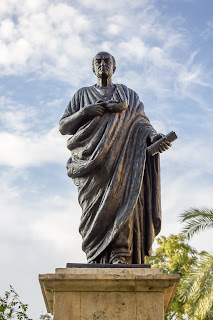Latin may be considered a "dead" language, not spoken by any particular group of people, but its presence in so many areas of our speech is proof of the power it wields in precise communication. Non compos mentis, not of sound mind, has made its way to the forefront of our political life as we contend with the chaos pervading American culture today. A legal phrase, it was first used in 13th century English law to describe people affected by madness, the loss of memory or the ability to reason. Although one might figuratively say that the definition hasn't changed much over the centuries, we most often use the phrase to express the condition of not having mastery over one's mind. Our views of mental illness, however, have changed over the years from the heinous punishments of burning and dunking of women accused of being witches to tragic institutionalism and incarceration. Through the decades as we continue to distinguish human behavior from mental disabilities, we improve our perspective on compos mentis, a sound mind.
Having said that, the media universe constantly updates the public regarding the current President of the United States and questioning the soundness of his mind, and, as a result of his inciting an insurrection on the U.S. Capitol that threatened the lives of Congress men and women and resulted in five deaths, he has been banned from social media and has been impeached for a second time by the House of Representatives with the lowest rating, 29%, of any American President in history. Although this crisis may have been the spark for this post, it isn't the conflagration that burns through the pages of this blog. The question I am posing here is why so many of us readily sacrifice the most important asset we have as individuals, the mastery and control of our own minds. What have we to gain that so outweighs this critical mastery of a sound mind? Perhaps we should all take a look in the mirror. I offer these considerations:
1. Having traveled a bit and met and made friends in other parts of the world, I believe I can say without hesitation that Americans are often viewed as workaholics who love money. I won't make a decision about the veracity of that criticism, but what is obvious is that we try to make too many decisions while in a steady state of distraction and multi-tasking, which leads to emotional fatigue.
2. Frustration, anger, love, desire for more and more and more all hinder our ability to make good decisions. Emotions can easily lead to greed and power, and in America, where anything seems possible, people are willing to go there despite the cost.
3. To much information paralyzes us, but too little information leaves us ill prepared to make rational decisions. We tend to lean toward laziness in checking facts, the consequence of which is one-sided tribalism and the hazard of locking ourselves in the past.
4. We often fail to see the big picture and every problem connected to it. Nothing exists in a vacuum. We live in a cause and effect world, and yet we cherry pick and refuse to address the connections that could begin the healing. And as a vicious cycle, we find ourselves in over-dependence on others to do and say the right thing. Tribalism raises its ugly head again.
5. Isolation from truth and failure to communicate the facts result in the insurmountable hijacking of sound minds through misinformation. It goes without saying (or does it?) that knowing the facts contributes to more rational decision making.
6. Because we often suffer from a naïve dependence on others to provide necessary information for our well being, we do not expect the unexpected. Why should we, you say. Others--elected officials or others in authority, will do their part and take care of business, but do we really believe in the infallibility of people, giving them undeserved or unearned trust? Or are we locked in to the past, a simpler time when weapons and technology and unimaginable wealth and power rarely played a significant role in harming us? Do we truly believe a false sense of happiness or security can overcome misery? Can we live forever in a bubble where we don't have to look at the immensity of the socio-economic issues that have become unbearable for a large percentage of the population?
Has the American view of non compos mentis, not of sound mind, taken on a new wrinkle, a new dimension in the principles of good decision making? Is it the new status quo? The pandemic that brought on the unbearable weariness of illness and loss of life, of jobs and income, of traditional education and social interactions has certainly affected our ability to make good decisions, but have we gone down that dark rabbit hole so far that we can't return? I don't think so, but it's going to take the historic strength that those who came before us had--those who crossed frontiers to settle the west, who passed through the gates of immigration alongside Lady Liberty for greater opportunity, my own parents who survived the Depression and World War II. So many of us have been cradled in the arms of prosperity that we have become weak in the face of adversity. It's never too late to turn this around. We are, despite everything else, a nation of strength in every way.
Here's another Latin phrase. I offer you Seneca.
Ad astra per aspera--to the stars through difficulties
Be well and stay strong, friends.




